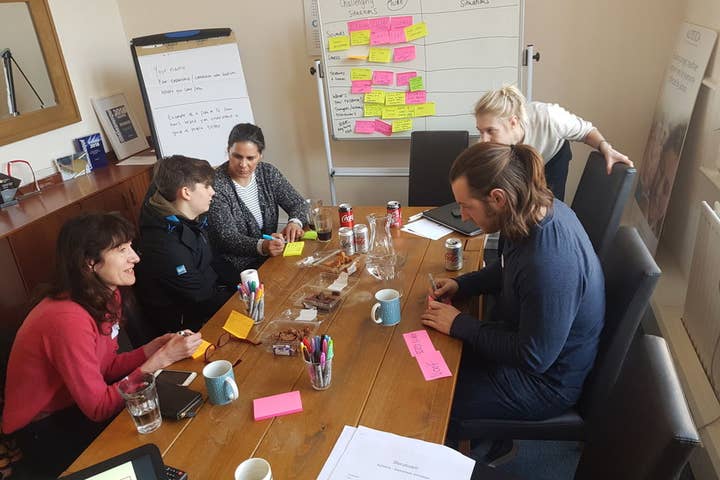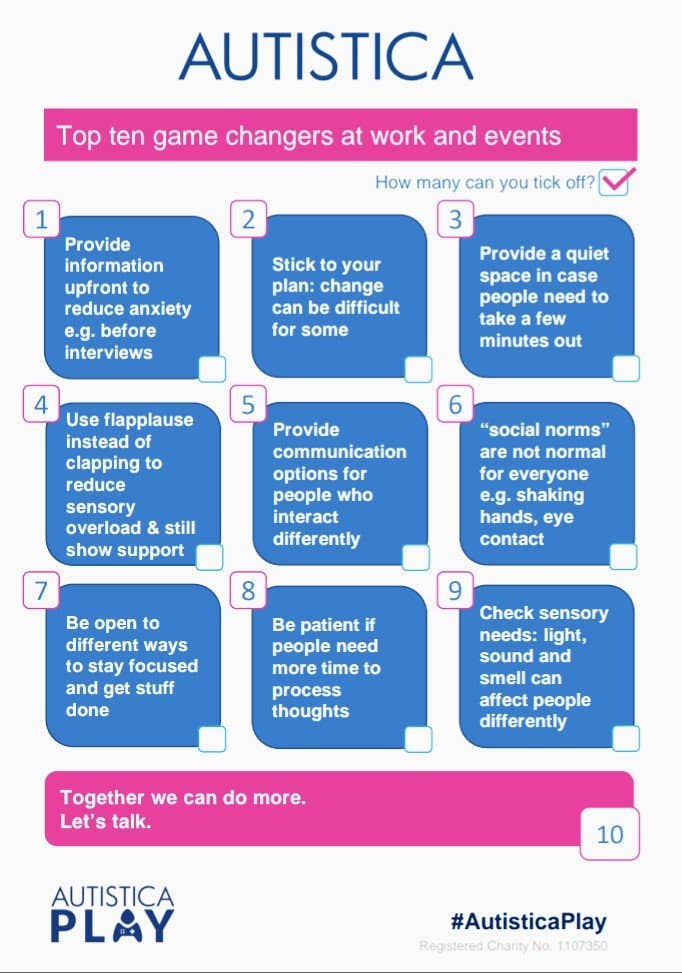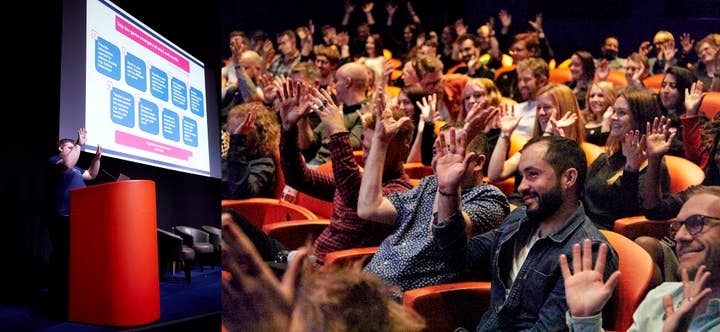Diversity isn't only skin deep: Accommodating autistic and neurodiverse people
Austistica Play ambassador Dominic Shaw explains how to consider talent that is often overlooked and underused
An amazing aspect the games industry has over numerous other business sectors is the fact that so few or as many people can come together and collaborate to produce an unlimited assortment of work. It can vary from compelling stories and enriching interactive experiences, to just simply fun, engaging games that grab someone's attention all night long.
Such creative work certainly attracts folks from all over, producing grand opportunities not seen before and creating fast-paced environments to meet the demands of potential consumers. You would think such an industry would have no glaring issues of diversity and bringing in people from a range of backgrounds.
This, however, is not the case. Although some companies are making great strides in retaining people that don't conform to common stereotypes you think of someone working in the video games sector, more can be done to make the industry a more diverse and in turn inclusive workspace for all.
Autism is a neurological condition where communication, social interaction and even motor skills are affected. This results in people on the autistic spectrum often having trouble expressing feelings while struggling to read social cues and sensory issues. They might focus towards certain interests that develop intensely and take up attention exceptionally over most other things, and perhaps engage in repetitive and compulsive behaviours.
Not say everyone on the spectrum is exactly alike and experience all the traits mentioned above. Autism is a very individualised condition, therefore it manifests itself in different ways within different people.

What I've found in my experience as an autistic person in the games industry is more often than not due to the negative stigmas that are associated with autistic people -- such as being unpredictable, requiring a lot of maintenance, and generally being different compared to neurotypical individuals. Many employers are quick to judge and overlook those on the spectrum who may behave differently in interview scenarios or find certain questions in application forms challenging, disregarding the potential talent they could acquire due to a lack of understanding and preconceived notions.
"Many assume it is time-consuming and costly to adjust to autistic and neurodiverse talent. This is a completely misinformed assumption"
Sadly, it is statistically proven that only 16% of autistic people in the UK are in full-time paid employment. This is not solely focused towards video games but all industries in the UK.
That's not to say that even when a company hires autistic talent, they can retain and treat those on the autistic spectrum equally like any other staff member. Unfortunately I have experienced first-hand being treated badly, working within toxic environments and discriminated against due to my autism, even by some highly regarded businesses in the games industry.
Because of such instances and a lack of affordable legal support, what you often find is many people hide the fact they are autistic to avoid losing their jobs, alongside being treated harshly. It is quite rare to find autistic talent comfortable, happily employed and earning a liveable wage within the video games sector, let alone other industries.
This is why efforts to make the industry more diverse and inclusive for as many people as possible are vital. The question now is how we do achieve such ambitions?
Many people assume it is a time-consuming, costly process to adjust to autistic and neurodiverse talent. However, this is a completely misinformed assumption as there are simple, practical changes that every workplace could implement right away without excluding individuals or paying thousands of pounds to do.
In fact, there are 10 suggestions:

Back in September of this year, I did a microtalk at the GamesIndustry.biz Best Places To Work Awards, where I explained a few of these game changers to everyone in the audience. With the extra space to elaborate I would like to shed some light into each change by presenting an example of how to implement each into your workplace and/or event.
Provide information upfront to reduce anxiety (e.g. before interviews)
The recruitment process at any company can be ruthless, but that doesn't mean it should be stressful. By giving candidates information like what questions they will be asked, who will they be meeting and other essential information beforehand, you are not only guaranteeing every applicant has a fair and equal chance, you are also allowing them to formulate and display their 'best selves' to you -- thus future-proofing a better decision for the company overall.
Stick to your plan
Change can be difficult for some. The games industry is constantly growing and shifting, so it is understandable that plans might alter due to losses or new opportunities. On the other hand, sticking to a core plan is vital to ensure people stay onboard and focused. It is in any management's capability to be able to keep the plan together or if change must happen, communicate the information to everyone involved so no one is excluded or is kicked off the beaten path.
Provide a quiet space in case people need to take a few minutes out
This could be a corner of your office, an unused meeting room when it is free, or you could even purchase a small garden shed to put up in your workspace and dedicate that as a chill out area.
Use flapplause instead of clapping
This reduces sensory overload and still shows support.

Communication options for people who interact differently
Whether it's through social media, on the phone or via video chat, giving someone more choice in how they engage can only be for the better. By restricting someone, they naturally feel less inclined and comfortable to deliver their best.
Social norms are not normal for everyone
Networking events can be hard for anyone, yet they are especially tough on autistic and neurodiverse individuals who might not be use to certain standards -- such as shaking hands or eye contact -- and find mingling with others a challenge. So instead of making a social introduction a great barrier, why not implement a traffic light-based name badge system?
Green means someone is open to talk to anyone, amber means a person is cautious and less likely to engage fully, while red means an person rather not be approached by strangers. You don't even have to force everyone to wear a badge -- just offer it to be worn so new and anxious faces know who they can approach.
"It is so significant for the industry not to simply be more aware of autism and other neurodivergent conditions, yet implement strategies to make the sector a more accessible, holistic environment"
Be open to different ways to stay focused and get stuff done
Everyone learns and works differently. Some work better while listening to music, others prefer working in silence, with few being able to balance working with socialising. Don't restrict people too heavily, think outside the box on how you can accommodate various styles within your workplace and respect how people work. As long they are efficient and get the job done, what is the harm?
Be patient if people need more time to process thoughts
Though being on the go constantly helps the business run like clockwork, it also can create a dismissive attitude in people -- to the point that losing sight of key contacts at events or resources in the workplace is inevitable due to the slow speed in communications and operations between the two. Nonetheless, everyone wants to feel valued and respected so giving people the chance to go at their own pace might not only drive further productivity, it might also lead to a new appreciation in a different lane.
Check sensory needs
Lights, sounds and smell can affect people differently. Just like you would do for people's dietary requirements, open the floor for questions and allow individuals to give feedback on how they like to be interacted with. This not only helps with engagement but also helps you learn more about your audience if it is for an event or your fellow colleagues if applied within the workplace.
Together we can do more -- so let's talk
Approach charities and organisations like Autistica to support you in progressive adjustments and help you implement them into your work culture.
What you'll find is many of these changes cross over with one another and can be used in several instances. Furthermore, they don't just simply benefit autistic and neurodiverse people -- on the contrary, these game changers can help all sorts of people in any organisation might they be neurotypical or have other factors to themselves.
It is so significant for the industry not to simply be more aware of autism and other neurodivergent conditions, yet implement strategies and take action to make the video games sector a more accessible, holistic environment to work in. To apply these changes and more it only takes effort, commitment and a work culture open to adapting.
Dominic Shaw is a young professional within the games industry, who is also an ambassador for the UK's leading autism research charity Autistica. To find out more details about Autistica's involvement within video games, please visit their website or get in touch with games partnership manager Jake Mackey.